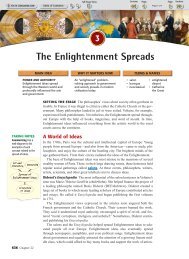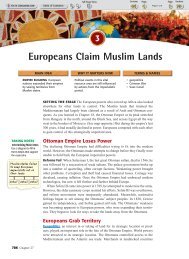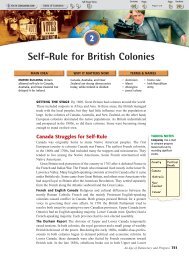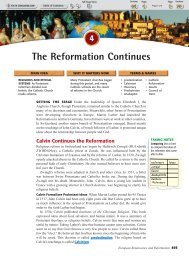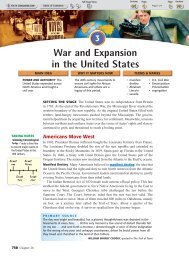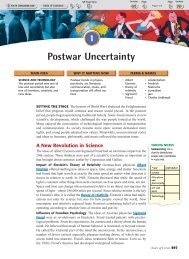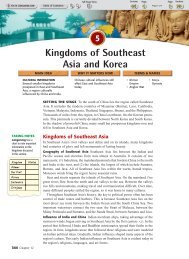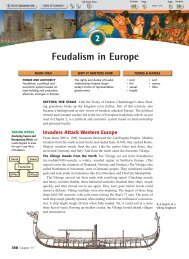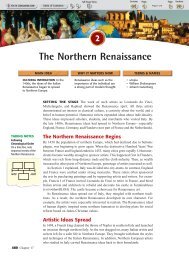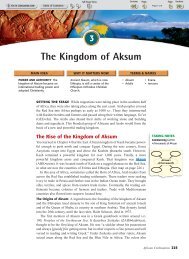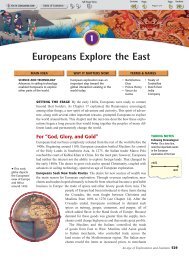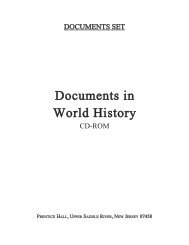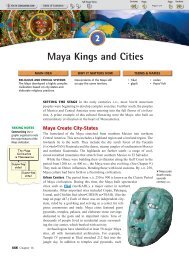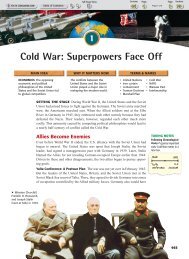You also want an ePaper? Increase the reach of your titles
YUMPU automatically turns print PDFs into web optimized ePapers that Google loves.
The Unification of <strong>Ch</strong>ina<br />
4<br />
MAIN IDEA WHY IT MATTERS NOW TERMS & NAMES<br />
RELIGIOUS AND ETHICAL<br />
SYSTEMS The social disorder<br />
of the warring states contributed<br />
to the development of three<br />
<strong>Ch</strong>inese ethical systems.<br />
The people, events, and ideas<br />
that shaped <strong>Ch</strong>ina’s early history<br />
continue to influence <strong>Ch</strong>ina’s<br />
role in today’s world.<br />
• Confucius<br />
• filial piety<br />
• bureaucracy<br />
• Daoism<br />
• Legalism<br />
• I <strong>Ch</strong>ing<br />
• yin and yang<br />
• Qin Dynasty<br />
• Shi Huangdi<br />
• autocracy<br />
SETTING THE STAGE The Zhou Dynasty, as you read in <strong>Ch</strong>apter 2, lasted for at<br />
least eight centuries, from approximately 1027 to 256 B.C.For the first 300 years<br />
of their long reign, the Zhou kings controlled a large empire, including both eastern<br />
and western lands. Local rulers reported to the king, who had the ultimate<br />
power. By the latter years of the Zhou Dynasty, the lords of dependent territories<br />
began to think of themselves as independent kings. Their almost constant conflict,<br />
which is known as “the warring states period,” led to the decline of the<br />
Zhou Dynasty.<br />
TAKING NOTES<br />
Recognizing Effects<br />
Use a web to indicate<br />
how the chaos of the<br />
warring states affected<br />
the philosophy, politics,<br />
and cities of <strong>Ch</strong>ina.<br />
<strong>Ch</strong>aos of the<br />
warring states<br />
Politics<br />
Philosophy<br />
Cities<br />
Confucius and the Social Order<br />
Toward the end of the Zhou Dynasty, <strong>Ch</strong>ina moved away from its ancient values<br />
of social order, harmony, and respect for authority. <strong>Ch</strong>inese scholars and philosophers<br />
developed different solutions to restore these values.<br />
Confucius Urges Harmony <strong>Ch</strong>ina’s most influential scholar was Confucius<br />
(kuhn•FYOO•shuhs). Born in 551 B.C., Confucius lived in a time when the Zhou<br />
Dynasty was in decline. He led a scholarly life, studying and teaching history,<br />
music, and moral character.<br />
Confucius was born at a time of crisis and violence in <strong>Ch</strong>ina. He had a deep<br />
desire to restore the order and moral living of earlier times to his society.<br />
Confucius believed that social order, harmony, and good government could be<br />
restored in <strong>Ch</strong>ina if society were organized around five basic relationships.<br />
These were the relationships between: 1) ruler and subject, 2) father and son,<br />
3) husband and wife, 4) older brother and younger brother, and 5) friend and<br />
friend. A code of proper conduct regulated each of these relationships. For example,<br />
rulers should practice kindness and virtuous living. In return, subjects<br />
should be loyal and law-abiding.<br />
Three of Confucius’s five relationships were based upon the family. Confucius<br />
stressed that children should practice filial piety, or respect for their parents and<br />
ancestors. Filial piety, according to Confucius, meant devoting oneself to one’s<br />
parents during their lifetime. It also required honoring their memory after death<br />
through the performance of certain rituals.<br />
104 <strong>Ch</strong>apter 4
In the following passage, Confucius—the<br />
“Master”—expresses his thoughts on the concept:<br />
Vocabulary<br />
legend: a story<br />
handed down from<br />
earlier times, especially<br />
one believed<br />
to be historical<br />
PRIMARY SOURCE<br />
Ziyou [a disciple of Confucius] asked about filial piety.<br />
The Master said: “Nowadays people think they are<br />
dutiful sons when they feed their parents. Yet they also<br />
feed their dogs and horses. Unless there is respect,<br />
where is the difference?”<br />
CONFUCIUS, Analects 2.7<br />
Confucius wanted to reform <strong>Ch</strong>inese society by<br />
showing rulers how to govern wisely. Impressed by<br />
Confucius’s wisdom, the duke of Lu appointed him<br />
minister of justice. According to legend, Confucius<br />
so overwhelmed people by his kindness and courtesy<br />
that almost overnight, crime vanished from Lu.<br />
When the duke’s ways changed, however, Confucius<br />
became disillusioned and resigned.<br />
Confucius spent the remainder of his life teaching.<br />
His students later collected his words in a book<br />
called the Analects. A disciple named Mencius<br />
(MEHN•shee•uhs) also spread Confucius’s ideas.<br />
Confucian Ideas About Government Confucius<br />
said that education could transform a humbly born<br />
person into a gentleman. In saying this, he laid the<br />
groundwork for the creation of a bureaucracy, a<br />
trained civil service, or those who run the government.<br />
According to Confucius, a gentleman had<br />
four virtues: “In his private conduct he was courteous,<br />
in serving his master he was punctilious [precise],<br />
in providing for the needs of the people he<br />
gave them even more than their due; in exacting<br />
service from the people, he was just.” Education<br />
became critically important to career advancement<br />
in the bureaucracy.<br />
Confucianism was never a religion, but it was an<br />
ethical system, a system based on accepted principles<br />
of right and wrong. It became the foundation<br />
for <strong>Ch</strong>inese government and social order. In addition,<br />
the ideas of Confucius spread beyond <strong>Ch</strong>ina<br />
and influenced civilizations throughout East Asia.<br />
Confucius<br />
551–479 B.C.<br />
Confucius was born to a<br />
poor family. As an adult, he<br />
earned his living as a<br />
teacher. But he longed to<br />
put his principles into<br />
action by advising political<br />
leaders. Finally, at around<br />
age 50, Confucius won a<br />
post as minister in his home state. According to<br />
legend, he set such a virtuous example that a<br />
purse lying in the middle of the street would be<br />
untouched for days.<br />
After Confucius resigned his post as<br />
minister, he returned to teaching. He<br />
considered himself a failure because he had<br />
never held high office. Yet Confucius’s ideas<br />
have molded <strong>Ch</strong>inese thought for centuries.<br />
Laozi<br />
sixth century B.C.<br />
Although a person named<br />
Laozi is credited with<br />
being the first philosopher<br />
of Daoism, no one knows<br />
for sure whether he really<br />
existed. Legend has it that<br />
Laozi’s mother carried him<br />
in her womb for 62 years<br />
and that he was born with white hair and<br />
wrinkled skin. Laozi’s followers claimed that he<br />
was a contemporary of Confucius.<br />
Unlike Confucius, however, Laozi believed<br />
that government should do as little as possible<br />
and leave the people alone. Laozi thought that<br />
people could do little to influence the outcome<br />
of events. Daoism offered communion with<br />
nature as an alternative to political chaos.<br />
RESEARCH LINKS For more on Confucius and<br />
Laozi, go to classzone.com<br />
Other Ethical Systems<br />
In addition to Confucius, other <strong>Ch</strong>inese scholars and philosophers developed ethical<br />
systems with very different philosophies. Some stressed the importance of nature,<br />
others, the power of government.<br />
Daoists Seek Harmony For a <strong>Ch</strong>inese thinker named Laozi (low•dzuh), who may<br />
have lived during the sixth century B.C., only the natural order was important. The<br />
natural order involves relations among all living things. His book Dao De Jing<br />
(The Way of Virtue) expressed Laozi’s belief. He said that a universal force called<br />
the Dao (dow), meaning “the Way,” guides all things. Of all the creatures of nature,<br />
First Age of Empires 105
according to Laozi, only humans fail to follow the Dao. They argue about questions<br />
of right and wrong, good manners or bad. According to Laozi, such arguments are<br />
pointless. In the following, he explains the wisdom of the Dao:<br />
P RIMARY SOURCE<br />
The Dao never does anything,<br />
yet through it all things are done.<br />
If powerful men and women<br />
could center themselves in it,<br />
the whole world would be transformed<br />
by itself, in its natural rhythms.<br />
People would be content<br />
with their simple, everyday lives, in harmony, and free of desire.<br />
Analyzing Primary<br />
Sources<br />
What do you<br />
think is the Daoist<br />
attitude toward<br />
being a powerful<br />
person?<br />
When there is no desire,<br />
all things are at peace.<br />
LAOZI, Dao De Jing, Passage 37<br />
The philosophy of Laozi came to be known as Daoism. Its search for knowledge<br />
and understanding of nature led Daoism’s followers to pursue scientific studies.<br />
Daoists made many important contributions to the sciences of alchemy,<br />
astronomy, and medicine.<br />
Legalists Urge Harsh Rule In sharp contrast to the followers of Confucius and<br />
Laozi was a group of practical political thinkers called the Legalists. They believed<br />
that a highly efficient and powerful government was the key to restoring order in<br />
society. They got their name from their belief that government should use the law<br />
to end civil disorder and restore harmony. Hanfeizi and Li Si were among the<br />
founders of Legalism.<br />
The Legalists taught that a ruler should provide rich rewards for people who carried<br />
out their duties well. Likewise, the disobedient should be harshly punished. In<br />
practice, the Legalists stressed punishment more than rewards. For example, anyone<br />
caught outside his own village without a travel permit should have his ears or<br />
nose chopped off.<br />
The Legalists believed in controlling ideas as well as actions. They suggested<br />
that a ruler burn all writings that might encourage people to criticize government.<br />
<strong>Ch</strong>inese Ethical Systems<br />
Confucianism Daoism Legalism<br />
• Social order, harmony, and good<br />
government should be based on<br />
family relationships.<br />
• Respect for parents and elders is<br />
important to a well-ordered<br />
society.<br />
• Education is important both to<br />
the welfare of the individual and<br />
to society.<br />
•The natural order is more<br />
important than the social order.<br />
•A universal force guides all things.<br />
• Human beings should live simply<br />
and in harmony with nature.<br />
•A highly efficient and powerful<br />
government is the key to social<br />
order.<br />
• Punishments are useful to<br />
maintain social order.<br />
•Thinkers and their ideas should<br />
be strictly controlled by the<br />
government.<br />
SKILLBUILDER: Interpreting <strong>Ch</strong>arts<br />
1. Comparing Which of these three systems stresses the importance of government and a well-ordered society?<br />
2. Synthesizing Which of these systems seems to be most moderate and balanced? Explain.<br />
106 <strong>Ch</strong>apter 4
Summarizing<br />
How did the<br />
Legalists think that<br />
a society could be<br />
made to run well?<br />
After all, it was for the prince to govern and the people to obey. Eventually,<br />
Legalist ideas gained favor with a prince of a new dynasty that replaced the<br />
Zhou. That powerful ruler soon brought order to <strong>Ch</strong>ina.<br />
I <strong>Ch</strong>ing and Yin and Yang People with little interest in the philosophical<br />
debates of the Confucians, Daoists, and Legalists found answers to<br />
life’s questions elsewhere. Some consulted a book of oracles called<br />
I <strong>Ch</strong>ing (also spelled Yi Jing) to solve ethical or practical problems.<br />
Readers used the book by throwing a set of coins, interpreting the results,<br />
and then reading the appropriate oracle, or prediction. The I <strong>Ch</strong>ing (The Book<br />
of <strong>Ch</strong>anges) helped people to lead a happy life by offering good advice and simple<br />
common sense.<br />
Other people turned to the ideas of ancient thinkers, such as the concept of yin<br />
and yang—two powers that together represented the natural rhythms of life. Yin<br />
represents all that is cold, dark, soft, and mysterious. Yang is the opposite—warm,<br />
bright, hard, and clear. The symbol of yin and yang is a circle divided into halves,<br />
as shown in the emblem to the upper right. The circle represents the harmony of<br />
yin and yang. Both forces represent the rhythm of the universe and complement<br />
each other. Both the I <strong>Ch</strong>ing and yin and yang helped <strong>Ch</strong>inese people understand<br />
how they fit into the world.<br />
▲ Traditional<br />
yin-and-yang<br />
symbol<br />
The Qin Dynasty Unifies <strong>Ch</strong>ina<br />
In the third century B.C., the Qin Dynasty (chihn) replaced the Zhou Dynasty. It<br />
emerged from the western state of Qin. The ruler who founded the Qin Dynasty<br />
employed Legalist ideas to subdue the warring states and unify his country.<br />
A New Emperor Takes Control In 221 B.C., after ruling for over 20 years, the Qin<br />
ruler assumed the name Shi Huangdi (shihr hwahng•dee), which means “First<br />
Emperor.” The new emperor had begun his reign by halting the internal battles that<br />
had sapped <strong>Ch</strong>ina’s strength. Next he turned his<br />
attention to defeating invaders and crushing resistance<br />
within <strong>Ch</strong>ina to his rule. Shi Huangdi’s armies<br />
attacked the invaders north of the Huang He and<br />
south as far as what is now Vietnam. His victories<br />
doubled <strong>Ch</strong>ina’s size. Shi Huangdi was determined<br />
to unify <strong>Ch</strong>ina.<br />
Shi Huangdi acted decisively to crush political<br />
opposition at home. To destroy the power of rival<br />
warlords, he introduced a policy called “strengthening<br />
the trunk and weakening the branches.” He commanded<br />
all the noble families to live in the capital<br />
city under his suspicious gaze. This policy, according<br />
to tradition, uprooted 120,000 noble families.<br />
Seizing their land, the emperor carved <strong>Ch</strong>ina into 36<br />
administrative districts. He sent Qin officials to<br />
control them.<br />
To prevent criticism, Shi Huangdi and his prime<br />
minister, the Legalist philosopher Li Su, murdered<br />
hundreds of Confucian scholars. They also ordered<br />
“useless” books burned. These books were the works<br />
of Confucian thinkers and poets who disagreed with<br />
the Legalists. Practical books about medicine and<br />
farming, however, were spared. Through measures<br />
▼ Although a<br />
tyrant, Shi<br />
Huangdi is<br />
considered the<br />
founder of<br />
unified <strong>Ch</strong>ina.<br />
The word Qin is<br />
the origin of<br />
<strong>Ch</strong>ina.<br />
First Age of Empires 107
The Great Wall of <strong>Ch</strong>ina<br />
From the Yellow Sea in the east<br />
to the Gobi Desert in the west,<br />
the Great Wall twisted like a<br />
dragon’s tail for thousands of<br />
miles. Watch towers rose every<br />
200 to 300 yards along the wall.<br />
In the time of Shi Huangdi,<br />
hundreds of thousands of<br />
peasants collected, hauled, and<br />
dumped millions of tons of<br />
stone, dirt, and rubble to fill the<br />
core of the Great Wall.<br />
Slabs of cut stone on the outside<br />
of the wall enclosed a heap of<br />
pebbles and rubble on the inside.<br />
Each section of the wall rose to a<br />
height of 20 to 25 feet.<br />
The Qin Dynasty, 221–202 B.C.<br />
40°N<br />
Although Shi Huangdi built the earliest<br />
unified wall, the wall as it exists today dates<br />
from the later Ming Dynasty (1368–1644).<br />
0<br />
0<br />
Qin Dynasty<br />
Extent of Zhou Dynasty<br />
(Approximate)<br />
Great Wall<br />
TIBET<br />
H I M A L A Y A S<br />
500 Miles<br />
1000 Kilometers<br />
100°E<br />
MONGOLIA<br />
<strong>Ch</strong>ang<br />
Wei He<br />
Hao<br />
Jiang<br />
Anyang<br />
He<br />
Huang<br />
Luoyang<br />
<strong>Ch</strong>'ang-an<br />
(Xi'an)<br />
KOREA<br />
Yellow<br />
Sea<br />
East<br />
<strong>Ch</strong>ina<br />
Sea<br />
Taiwan<br />
SKILLBUILDER: Interpreting Visual Sources<br />
1. Making Inferences What were the benefits of the watch<br />
towers along the wall?<br />
2. Drawing Conclusions What modern structures serve the<br />
same purpose as the watch towers?<br />
INDIA<br />
Bay of<br />
Bengal<br />
BURMA<br />
V IETNAM<br />
( A NNAM)<br />
Xi<br />
Jiang<br />
South<br />
<strong>Ch</strong>ina<br />
Sea<br />
120°E<br />
20°N<br />
108 <strong>Ch</strong>apter 4
Recognizing<br />
Effects<br />
What were<br />
the positive and<br />
negative effects of<br />
Shi Huangdi’s rule?<br />
such as these, Shi Huangdi established an autocracy—a government that has<br />
unlimited power and uses it in an arbitrary manner.<br />
A Program of Centralization Shi Huangdi’s sweeping program of centralization<br />
included the building of a highway network of more than 4,000 miles. Also, he set<br />
the same standards throughout <strong>Ch</strong>ina for writing, law, currency, and weights and<br />
measures—even down to the length of cart axles. This last standard made sure that<br />
all vehicles could fit into the ruts of <strong>Ch</strong>ina’s main roads.<br />
Under Shi Huangdi’s rule, irrigation projects increased farm production. Trade<br />
blossomed, thanks to the new road system. Trade pushed a new class of merchants<br />
into prominence. Despite these social advances, harsh taxes and repressive government<br />
made the Qin regime unpopular. Shi Huangdi had unified <strong>Ch</strong>ina at the<br />
expense of human freedom.<br />
Great Wall of <strong>Ch</strong>ina Scholars hated Shi Huangdi for his book burning. Poor people<br />
hated him because they were forced to work on the building of a huge defensive<br />
wall. Earlier, Zhou rulers had erected smaller walls to discourage attacks by<br />
northern nomads. Shi Huangdi determined to close the gaps and extend the wall<br />
almost the length of the empire’s border. Enemies would have to gallop halfway to<br />
Tibet to get around it.<br />
The Great Wall of <strong>Ch</strong>ina arose on the backs of hundreds of thousands of peasants.<br />
The wall builders worked neither for wages nor for love of empire. They faced<br />
a terrible choice: work on the wall or die. Many of the laborers worked on the wall<br />
and died anyway, victims of the crushing labor or the harsh winter weather.<br />
The Fall of the Qin The Qin Dynasty lasted only a short time. Though fully as<br />
cruel as his father, Shi Huangdi’s son proved less able. Peasants rebelled just three<br />
years after the second Qin emperor took office. One of their leaders, a peasant from<br />
the land of Han, marched his troops into the capital city. By 202 B.C., the harsh Qin<br />
Dynasty gave way to the Han Dynasty, one of the longest in <strong>Ch</strong>inese history.<br />
While the <strong>Ch</strong>inese explored the best ways to govern, ancient Greece also was<br />
experimenting with different forms of government, as you will read in <strong>Ch</strong>apter 5.<br />
SECTION<br />
4<br />
ASSESSMENT<br />
TERMS & NAMES 1. For each term or name, write a sentence explaining its significance.<br />
• Confucius • filial piety • bureaucracy • Daoism • Legalism • I <strong>Ch</strong>ing • yin and yang • Qin Dynasty • Shi Huangdi • autocracy<br />
USING YOUR NOTES<br />
2. Which aspect of <strong>Ch</strong>inese life<br />
was most affected by the<br />
chaos created by the warring<br />
states?<br />
<strong>Ch</strong>aos of the<br />
warring states<br />
Politics<br />
Philosophy<br />
Cities<br />
MAIN IDEAS<br />
3. How did Confucius believe that<br />
social order, harmony, and<br />
good government could be<br />
restored in <strong>Ch</strong>ina?<br />
4. What did the Legalists see as<br />
the key to restoring order?<br />
5. What measures did Shi<br />
Huangdi take to crush political<br />
opposition at home?<br />
CRITICAL THINKING & WRITING<br />
6. HYPOTHESIZING How would followers of the three<br />
philosophical traditions in <strong>Ch</strong>ina react to the idea that<br />
“all men are created equal”?<br />
7. ANALYZING CAUSES Why did Shi Huangdi have his critics<br />
murdered?<br />
8. MAKING INFERENCES Would a ruler who followed<br />
Confucian or Daoist ideas have built the Great Wall?<br />
Why or why not?<br />
9. WRITING ACTIVITY RELIGIOUS AND ETHICAL SYSTEMS<br />
Write a comparison-contrast paragraph in which you<br />
discuss the three <strong>Ch</strong>inese ethical systems.<br />
CONNECT TO TODAY<br />
PREPARING AN ORAL REPORT<br />
Research to find out about the Great Wall today. Prepare an oral report in which you explain<br />
what the Great Wall looks like today and what it is used for.<br />
First Age of Empires 109



